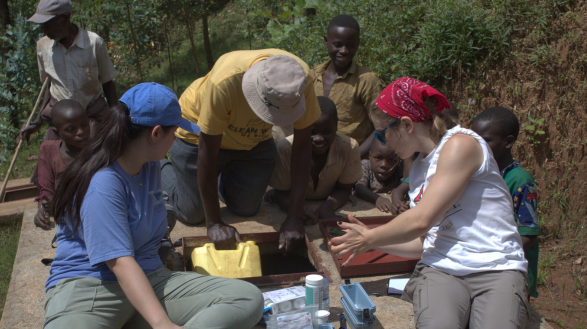Student team awarded $10,000 for Rwanda water system rehabilitation project
The Engineering Education Award is courtesy of the National Council of Examiners for Engineering and Surveying (NCEES)

Student team awarded $10,000 for Rwanda water system rehabilitation project
A College of Engineering and Computing (CEC) team from Miami’s Engineers Without Borders (EWB) student chapter has been awarded $10,000 by the NCEES for their project entitled “Rehabilitation of Water System in Rwanda.” This award is intended to encourage engineering students to engage with professional engineers (PEs) to advance and promote professional licensure in engineering fields.
The following CEC students, representing all four departments that make up CEC, were honored in the NCEES award announcement: Andrew LaMendola, Cameron (Lin Htet) Aung, Catherine Moul, Connor Williams, Emmet Tuason, Hugo (Aung Khant) Kyaw, Jack Nomina, Justin Aucreman, Louis Scholer, Minh Tran, Muhammad (Danish) Malik, Natthasit (Ben) Jantad, Rachael Harff, Sabrina Low, Sean Millard, Siena Madsen, Ty Cawein, Vivian Dao, and Will Sheehan. Emmett Tuason, Louis Scholer, Muhammad (Danish) Malik, Natthasit (Ben) Jantad, and Rachael Harff from EWB’s grant-writing team led the efforts to submit this entry to the 2025 NCEES engineering education award program.
The water system rehabilitation project honored by this award is focused on improving access to clean and reliable water for over 2,000 residents and students in a rural sector of Rwanda. In 2023, the team’s focus shifted to address critical needs in the Rugendabari sector and surrounding villages. Initial assessments identified major challenges, including exposed and erosion-prone pipeline segments, nonfunctional public taps, and insufficient water storage capacity to meet the growing demand. These conditions resulted in long, hazardous travel distances to water sources, disproportionately affecting women and children.
As part of their work to address these issues, the Miami University’s EWB team engineered the construction of a 20,000-liter stone masonry tank, completed in May 2024. Community partners also replaced a smaller 3,000-liter High-Density Polyethylene (HDPE) tank with a newer 10,000-liter model. To reduce contamination from livestock and improve water quality, the team implemented source protection measures such as gravel filtration and fencing. Spring boxes were equipped with reinforced protection infrastructure, constructed under the supervision of professional engineers to safeguard public health and meet sustainable design goals. The updated water pipeline now supplies water to four villages, Gitega Primary School, and both public and private tap stands.
“The $10,000 award is a massive help to the club as it provided the remaining funds we needed to carry out our remote implementation trips in Rwanda,” said Miami University’s EWB student chapter president Eddie Thant, who added that the monetary award now “allows the chapter to focus on other goals such as recruitment, with a very important in-person Rwanda trip in mind for next summer.”
The work of Miami’s EWB student chapter follows a four-phase engineering strategy: spring source rehabilitation, storage expansion, pipeline reinforcement, and distribution network extension. Ultimately, it aims to sustainably deliver at least 20 liters of potable water per person per day, promoting public health, safety, and resilience for years to come.
Still ongoing, this Rwanda water rehabilitation project has been a collaborative effort between licensed Professional Engineers (PEs) and Miami’s EWB students. The professional engineers that have mentored Miami’s EWB students include Chuck Dragga, Mike Brunner, Katherine Byrnes, Peter Kube, Gordon Miller, and Luke Carter, as well as recent CEC graduate Nathan Ashbrook ’24. Dr. Catherine Almquist, a professor in the Chemical, Paper, and Biomedical (CPB) engineering department and a PE, is the faculty advisor for EWB.
"I am very proud of the EWB students and their mentors,” said Catherine Almquist. “The application of their engineering talents to global humanitarian-based projects is commendable. I thank the mentors for their time and unwavering support of Miami's students, and I look forward to the continued success of Miami's student chapter of EWB."